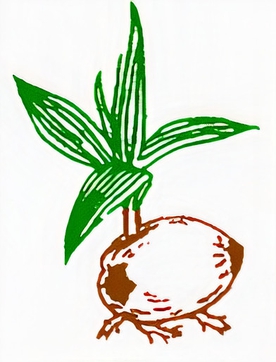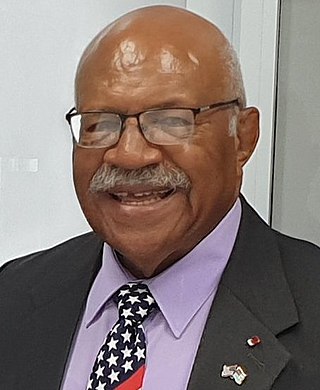Related Research Articles

Fiji, officially the Republic of Fiji, is an island country in Melanesia, part of Oceania in the South Pacific Ocean. It lies about 1,100 nautical miles north-northeast of New Zealand. Fiji consists of an archipelago of more than 330 islands—of which about 110 are permanently inhabited—and more than 500 islets, amounting to a total land area of about 18,300 square kilometres (7,100 sq mi). The most outlying island group is Ono-i-Lau. About 87% of the total population of 924,610 live on the two major islands, Viti Levu and Vanua Levu. About three-quarters of Fijians live on Viti Levu's coasts, either in the capital city of Suva, or in smaller urban centres such as Nadi or Lautoka. The interior of Viti Levu is sparsely inhabited because of its terrain.

The demographic characteristics of the population of Fiji are known through censuses, usually conducted in ten-year intervals, and has been analysed by statistical bureaus since the 1880s. The Fijian Bureau of Statistics (FBOS) has performed this task since 1996, the first enumerated Fiji census when an independent country. The 2017 census found that the permanent population of Fiji was 884,887, compared to 837,271 in the 2007 census. The population density at the time in 2007 was 45.8 inhabitants per square kilometre, and the overall life expectancy in Fiji was 67 years. Since the 1930s the population of Fiji has increased at a rate of 1.1% per year. Since the 1950s, Fiji's birth rate has continuously exceeded its death rate. The population is dominated by the 15–64 age segment. The median age of the population was 27.9, and the gender ratio of the total population was 1.03 males per 1 female.

Mahendra Pal Chaudhry is a Fijian politician and the leader of the Fiji Labour Party. Following a historic election in which he defeated the long-time former leader, Sitiveni Rabuka, the former trade union leader became Fiji's first Indo-Fijian Prime Minister on 19 May 1999, but exactly one year later, on 19 May 2000 he and most of his Cabinet were taken hostage by coup leader George Speight, in the Fiji coup of 2000. Unable to exercise his duties, he and his ministers were sacked by President Ratu Sir Kamisese Mara on 27 May; Mara intended to assume emergency powers himself but was himself deposed by the military leader, Commodore Frank Bainimarama.

The Fiji Labour Party, also known as Fiji Labour, is a political party in Fiji. Most of its support is from the Indo-Fijian community, although it is officially multiracial and its first leader was an indigenous Fijian, Dr. Timoci Bavadra. The party has been elected to power twice, with Timoci Bavadra and Mahendra Chaudhry becoming prime minister in 1987 and 1999 respectively. On both occasions, the resulting government was rapidly overthrown by a coup.

The Alliance Party, was the ruling political party in Fiji from 1966 to 1987. Founded in the early 1960s, its leader was Kamisese Mara, the founding father of the modern Fijian nation. Widely seen as the political vehicle of the traditional Fijian chiefs, the Alliance Party also commanded considerable support among the Europeans and other ethnic minorities, who, although comprising only 3–4% of Fiji's population, were over represented in the parliament. Indo-Fijians were less supportive, but the Fijian-European block vote kept the Alliance Party in power for more than twenty years.

Since becoming independent of the United Kingdom in 1970, Fiji has had four constitutions, and the voting system has changed accordingly.

Sitiveni Ligamamada Rabuka is a Fijian politician, former soldier and former sportsman who has served as Prime Minister of Fiji since 24 December 2022. He was the instigator of two military coups in 1987. He was democratically elected as Prime Minister of Fiji, serving from 1992 to 1999, and again in 2022, leading a three-party coalition. He also served as Chairman of the Great Council of Chiefs from 1999 to 2001, and later as Chairman of the Cakaudrove Provincial Council from 2001 to 2008.

General elections were held in Fiji between 18 and 25 February 1994. This election, the second since Fiji had become a republic following two military coups in 1987, was brought about by splits within the ruling Soqosoqo ni Vakavulewa ni Taukei (SVT) and by the withdrawal of the support of the Fiji Labour Party, which claimed that Prime Minister Sitiveni Rabuka had reneged on a deal to review Fiji's electoral system, which was heavily weighted in favour of ethnic Fijians, despite their being nearly equal in number to Indo-Fijians.

The National Federation Party is a Fijian political party founded by A.D. Patel in November 1968, as a merger of the Federation Party and the National Democratic Party. Though it claims to represent all Fiji Islanders, it is supported, in practice, almost exclusively by Indo-Fijians whose ancestors had come to Fiji between 1879 and 1916, mostly as indentured labourers. However, in the 2018 general election, the party recorded a considerable change in its support base due to the inclusion of more indigenous Fijian candidates.
Fijians are a nation and ethnic group native to Fiji, who speak Fijian and English and share a common history and culture.
Since attaining independence from the United Kingdom on 10 October 1970, Fijian history has been marked by exponential economic growth up to 1987, followed by relative stagnation, caused to a large extent by political instability following two military coups in 1987 and a civilian putsch in 2000. This was followed by another military coup in 2006. Rivalry between indigenous Fijians and Indo-Fijians, rather than ideological differences, have been the most visible cleavage of Fijian politics. Later in 2020, Fiji was hit by the global COVID-19 pandemic, which affected the economy and the daily lives of the people.
Ayodhya Prasad Sharma was an Indo-Fijian farmers' leader and politician. He formed the most successful farmers' union in Fiji and forced the Colonial Sugar Refining Company to make concessions to farmers after 60 years of total control over Fiji's economy. However, other Indo-Fijian leaders formed rival unions and his initial success was not repeated. He also served as a member of the Legislative Council between 1953 and 1959.

Islam has a high following in Fiji. There are about 60,000 Muslims in Fiji. Muslims in Fiji are mostly Sunni Muslim. In the 1966 Fiji elections, a Suva-based Muslim communal party, the Muslim Political Front, took part. Presently, Urdu is widely taught among Muslim schools for the Fijian Muslims all across Fiji.

The Fijian coup d'état of December 2006 was a coup d'état in Fiji carried out by Commodore Frank Bainimarama, Commander of the Republic of Fiji Military Forces (RFMF), against Prime Minister Laisenia Qarase and President Josefa Iloilo. It was the culmination of a political crisis that started the previous year, when the Qarase government introduced three bills to the Fijian Parliament. The Qoliqoli, Land Tribunal, and Reconciliation, Tolerance, and Unity Bills dealt with the ongoing ethnic conflicts in Fiji and the aftermath of the 2000 coup, and were considered to be pro-ethnic Fijian. Bainimarama presented the government with a list of demands on October 16 that included withdrawing the bills. Attempts at negotiation failed and the military launched the coup on 4 December. Parliament was dissolved, Qarase and his cabinet were dismissed, and some civilian officials were placed under house arrest. After the Great Council of Chiefs refused to appoint a cabinet friendly to the military, Bainimarama reached an understanding with Iloilo and reinstated him as President on 4 January 2007. Iloilo then appointed Bainimarama acting Prime Minister in charge of the Interim Cabinet.

General elections were held in Fiji on 17 September 2014 to select the 50 members of Parliament. The FijiFirst party, led by Prime Minister Frank Bainimarama, won a landslide victory, winning 32 of the 50 seats. The Social Democratic Liberal Party and the National Federation Party were the only other two parties to cross the 5% electoral threshold and win seats.
Attar Singh is an Indo-Fijian trade unionist. From 2002 to 2018 he was General Secretary of the Fiji Islands Council of Trade Unions (FICTU), one of two major umbrella bodies for trade unions in Fiji.

Charan Jeath Singh is an Indo-Fijian businessman, politician, and Cabinet Minister. From 1992 to 2005 he was Mayor of Labasa. He is the founder of the CJS Group of companies.
Unlike the majority of Fiji's Indian population, who are descendants of Indian indentured labourers brought to Fiji between 1879 and 1916, most of the Sikhs came to Fiji as free immigrants. Most Sikhs established themselves as farmers. Sikhs also came to Fiji as policemen, teachers and preachers. In recent years large numbers of Sikhs have emigrated from Fiji, especially to the United States, Canada, the United Kingdom, Australia and New Zealand. Sikhs in Fiji are generally referred to as Punjabis.
Indo-Fijians, also known as Indian Fijians, are Fijian citizens of Indian descent, and include people who trace their ancestry to various regions of India and the Indian subcontinent. Although Indo-Fijians constituted a majority of Fiji's population from 1956 through the late 1980s, discrimination and the resulting brain drain resulted in them numbering 313,798 (37.6%) out of a total of 827,900 people living in Fiji as of 2007.
References
- ↑ "Election results by the count". Archived from the original on 2007-09-27. Retrieved 2007-04-22.
- ↑ Pacific Heads of Veterinary and Animal Production Services Participants [ dead link ]